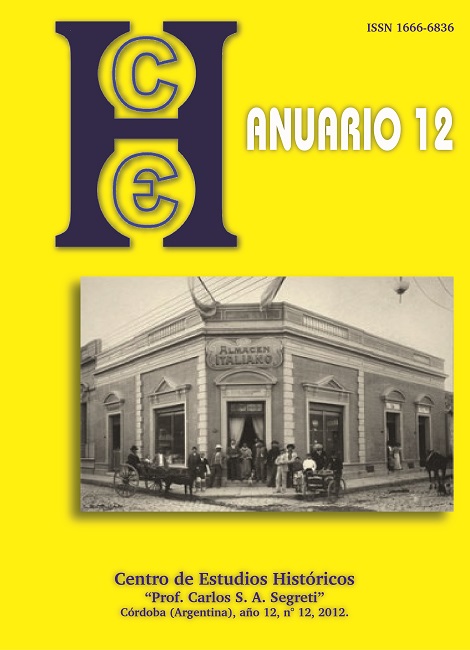Musical activity in Buenos Aires between 1804-1827: A practice that shapes the social spaces of the Buenos Aires elite?
DOI:
https://doi.org/10.52885/2683-9164.v0.n12.22705Keywords:
sociability, music, Buenos Aires, elite from the River Plate regionAbstract
Much has been written about the practices of sociability of different social groups and how they relate to different aspects of the social life from the River Plate region at the beginning of the 19th century. In this respect, the historical discipline has opened its perspectives of analysis building on an interesting and wide interdisciplinary framework, though it has not yet reached the field of musicology. Though it could be argued that the above-mentioned lack is based on the specificity of theoretical-practical analysis that the musicology requires, music could also be considered as a practice that loads with symbolism the different material space and the social interaction there developed. The aim of this work is to visualize the particular dynamic of the post colony Creole elite from Buenos Aires in order to achieve an approximation to the socializing spaces -the public and private ones- which the above mentioned group has transited - and therefore, to be able to decode from that stance the functional nature assigned to the music styles developed in the society of 1804-1827 Buenos Aires. For the above mentioned task, the statements of chroniclers, travellers, politicians, writers and diplomats, among others, will be analyzed comparatively. Additionally, we have worked with several newspapers published during the proposed period.
Downloads
References
AGULHON Maurice, El círculo burgués. La sociabilidad en Francia, 1810-1848, Buenos Aires, Siglo Veintiuno, 2009.
BERUTTI Juan Manuel, Memorias curiosas,Buenos Aires, Emecé, 2001.
BLACKING John, How Musical is Man?,Seattle, University of Washington Press, 1973.
BOSCH Mariano, Historia de la ópera en Buenos Aires: Origen del canto i la música. Las primeras compañías i los primeros cantantes, Buenos Aires, El Comercio, 1905.
BOURDIEU Pierre, El sentido social del gusto. Elementos para una sociología de la cultura, Buenos Aires, Siglo Veintiuno Editores, 2010.
CASTRO Paula y GROSSMAN Margarita, “TEATRO AMERICANO. Un tesoro de la Biblioteca Nacional de Argentina”, ponencia en el I Encuentro Nacional de Catalogadores, Buenos Aires, Noviembre de 2008.
GALLO Klaus, “Un escenario para la feliz experiencia. Teatro, política y vida pública en Buenos Aires. 1820-1827”, BATTICUORE Graciela, GALLO Klaus y MYERS Jorge (comp.), Resonancias románticas: Ensayos sobre historia de la cultura argentina, 1820-1890, Buenos Aires, EUDEBA, 2005.
GAYOL Sandra, Sociabilidad en Buenos Aires: hombres, honor y cafés 1862-1910, Buenos Aires, Ediciones del Signo, 2000.
GONZÁLEZ BERNALDO DE QUIRÓS Pilar, Civilidad y política en los orígenes de la Nación argentina. Las sociabilidades en Buenos Aires, 1829-1862, Buenos Aires, FCE, 2000.
GONZÁLEZ BERNALDO DE QUIRÓS Pilar, “La sociabilidad y la historia política”, PEIRE Jaime (comp.), Actores, representaciones e imaginarios. Homenaje a François-Xavier Guerra, Caseros, UNTREF, 2007.
JIMÉNEZ Juan Emilio y SALAS Juan Andrés, “La interpretación musical”, Historia general del arte en la Argentina, t. IV, Buenos Aires, Academia Nacional de Bellas Artes, 1983.
MYERS Jorge, “Una revolución en las costumbres: las nuevas formas de sociabilidad de la elite porteña, 1800-1860”, DEVOTO Fernando y MADERO Marta (dir.), Historia de la vida privada en la Argentina, t. I, Buenos Aires, Taurus, 1999.
SALTALAMACCIA Homero, Los datos y su creación, Puerto Rico, Kriteria, 1997.
Downloads
Published
Issue
Section
License
Aquellos autores/as que tengan publicaciones con esta revista, aceptan los términos siguientes:
- Los autores/as conservarán sus derechos de autor y garantizarán a la revista el derecho de primera publicación de su obra, el cuál estará simultáneamente sujeto a una Licencia de reconocimiento de Creative Commons. Se puede compartir, copiar, distribuir, ejecutar y comunicar públicamente la obra, siempre que: a) se cite la autoría y la fuente original de su publicación (revista, editorial y URL de la obra); b) no se use para fines comerciales; c) no se altere, transforme o genere una obra derivada a partir de esta obra.
- Los autores/as podrán adoptar otros acuerdos de licencia no exclusiva de distribución de la versión de la obra publicada (p. ej.: depositarla en un archivo telemático institucional o publicarla en un volumen monográfico) siempre que se indique la publicación inicial en esta revista.
- Se permite y recomienda a los autores/as difundir su obra a través de Internet (p. ej.: en archivos telemáticos institucionales o en su página web) después del proceso de publicación, lo cual puede producir intercambios interesantes y aumentar las citas de la obra publicada. (Véase El efecto del acceso abierto).









